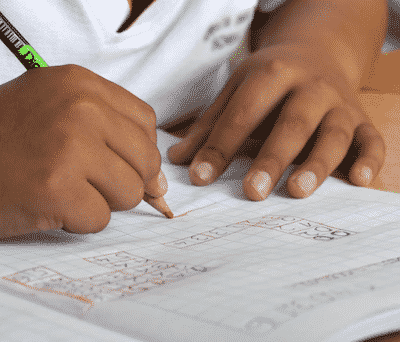
One of the toughest parts about seeing your kids through school is deciding to “let go.” To let them take responsibility, make mistakes, and “learn how to learn” under their own control.
But what happens when they get stuck, and aren’t able (or willing) to figure it out on their own?
Whether that’s on their first algebra assignment, a year-long science project they don’t know how to start, or a lingering book report where the due date has come and gone…
Sometimes it’s really hard to know when to step in and how to direct them without helping too much.
Ultimately the question we’re asking is:
Should parents help with homework? And if so, how much?
It’s one of the first questions we get from the parents we work with, so we put together a guide that you can use to find an answer that works for your family. Below is a breakdown of when it makes sense to lend a hand, and how to do it effectively.
Should parents help with homework? 5 common questions
First off, let’s address some common questions. Then we’ll outline some more general recommendations on what to do.

Question 1: How involved should I be when I review my daughter’s math homework and I see that there might be a wrong answer? Should I correct it or let her bring it to school with incorrect answers?
When your child starts a math assignment, it’s a great idea to make sure she understands the directions and watch her do the first few problems so she’s off to a good start and knows how to solve them.
A parent’s job is to make sure a child’s homework is complete, but not to critique it for accuracy – that’s the teacher or tutor’s job.
If it’s every now and then and your child is receptive to help, asking her to fix one or two answers is fine, but often what happens is that parents get in a power struggle over making sure the entire assignment is correct. Again, because you just want to aim for completion, don’t worry about one or two answers being wrong. I would let it go and let her get feedback in class from her teacher and classmates.
Question 2: What do I do when my daughter has a math question on her homework and I have no idea how to do it? The way that she is learning math is completely different than the way I learned. How should I direct her?
When your child is stuck, you have three options:
First, you can say, “Let me show you how to do it. This is the way.” However, it’s likely that your child will say, “Mom, that’s not how Mrs. Smith does it,” and there may be an argument or two on how to do it correctly.
You could also say, “You know what, honey? I already went to fourth grade. It’s your homework, not mine. You figure it out.” That’s probably not a great option either because your child won’t feel supported when they are frustrated with work.

The third and best way to assist with homework struggles, is to ask, “Are there other examples like this one in your book or in your notes? Have you ever seen this type of question before?” By encouraging your child to look for examples or similar problems, she’ll be more likely to solve the problem on her own.
Question 3: It takes my son a loooong time to complete his homework because he is constantly distracted or unfocused. How can I help him get it done in a reasonable amount of time?
Kids who toil for hours on seemingly simple assignments can be difficult to handle. And we actually have a name for them: “Super Bowl Kids” – the game is on for four hours, but they only play football for an hour.
Interestingly though, it isn’t that they’re not working diligently when they do finally sit down to work. They’re just easily distracted and taken away from that work frequently.
Research shows that when a task seems too large or difficult for kids (and students of any age), they often procrastinate more.
So in this situation, a timer is a surprisingly effective solution. Set the timer for 15 minutes at first, and let your child know that if they work as hard as they can for that 15 minutes, they get to take a 5-minute break when it’s done. Then repeat that process, slowly increasing the working time up to 25 minutes. Before they know it, the assignment is done, their confidence is up, and they’re onto the next thing.
Question 4: My daughter doesn’t write down her assignments since she thinks she can remember them. What are some tools we can use to work on this?
This one is much more common than you would think. The best solution?
First, set the expectation: they need to record their assignments somewhere. Then (and this is the key) allow them to choose how they’d like to do that. Whether it’s a good old-fashioned pencil and paper in a planner or agenda book, or by using an app on their phone, when kids get to choose the method, they’re much more likely to follow through.
Now keep in mind that writing down assignments is an important first step, but it’ll only take you so far without learning how to get organized and prioritize. Organization starts when your child walks through the front door after school, and should be an integral part of the evening routine each school night before they go to bed. Here are some easy organization tips you can implement in addition to recording assignments.
Question 5: My son struggles with tackling long-term assignments, so he procrastinates. How can I help him start his projects early?
As it turns out, this problem is actually very similar in nature to the “Super Bowl Kids” problem, in that students often procrastinate more the larger the project. And long-term assignments that may span an entire month or quarter exacerbate this tendency.
 Because these projects are so large though, simply jumping into work generally makes the issue worse rather than better. Instead, we need to add in some planning into the process, and this is where you can help.
Because these projects are so large though, simply jumping into work generally makes the issue worse rather than better. Instead, we need to add in some planning into the process, and this is where you can help.
A great way to do this is to make Sunday dinners the jumping-off point for planning. They’re already at the table, away from distractions, so start by tacking on 15-20 minutes either before or after dinner to review upcoming assignments for the week.
You can ask “What is coming up in class that you might need to start working on?” If your child says, “I have a test on Friday” or “I have a science project due in two weeks,” you can then take the opportunity to help them talk through some forward planning. You can ask, “What might you do to break down that project into smaller tasks?” And then have them outline the steps they need to take.
Now, keep in mind that this may not apply to elementary students, who are going to need more parental help planning out long-term assignments until their executive functioning skills are developed enough to plan weeks ahead.
Your role as a parent: How to oversee homework and studying without going too far
When it comes down to it, our problem as parents is this:
It’s incredibly tempting to check online or in your kid’s backpack to see what’s due… or to jump in to help with homework at the first sign of struggle, especially if our children aren’t forthcoming about their workload or issues they’re having in class.
And on top of that, when our students struggle with motivation, it’s common for them to do the bare minimum or avoid homework altogether.
But in an attempt to “help” we often go too far. We end up enabling our children by constantly checking to see what homework is due, and helping them get it done on time, even though this task should be their job.
Here’s what we recommend:
1. A certain amount of involvement is appropriate for elementary-school students.
As I mentioned above, kids who are elementary school age haven’t fully developed their executive functioning skills, and so aren’t quite ready to go it alone when it comes to planning and working through long assignments independently.
All this means in practice is that when you know there’s an assignment coming up, sit down with them and ask “What are the steps you’re going to need to do to complete this ?”
Then, instead of fully leaving it to them to work it out, open up a dialogue and try to let them come up with the steps. Then, when they get stuck, assist along the way. As they get the hang of it, you can help less and less over time. But don’t be afraid to help the process along when they’re young. The question shouldn’t be “should parents help with homework?” but rather, “how much should we help?” at this stage.
2. If your kids are in middle or high school, resist the impulse to help.
I recently spoke to one mom who called our office looking for a tutor. She was in quite a quandary. She was making it a regular practice to tap into her freshman son’s school portal each day and print out his assignments so they would be ready for him when he came home from school. When asked why, she responded, “If I didn’t, he would never do them.”
 One of the most important gifts a parent can give to their child is the ability to navigate life, including schoolwork, independently. Middle school is definitely the time to start. And in high school, it’s a must.
One of the most important gifts a parent can give to their child is the ability to navigate life, including schoolwork, independently. Middle school is definitely the time to start. And in high school, it’s a must.
They’ll never have the opportunity to develop the skills they’ll need to do that if you don’t set the stage for them to do these things on their own. So again, work with them to get the process started, but then adopt a “hands-off” philosophy so that they have the chance to work through it themselves.
3. Give them the tools.
Now once your kids start working through their homework independently, inevitably you’ll run across some issues with staying organized, getting their work done on time, and studying ahead of time for tests.
So it’s not usually enough to just set them loose on their work without helping them develop the skills they’ll need to make their way through it. These include:
- Organizational skills, which help kids feel more in control of their work and confident that they have a handle on all of the homework and studying they have to do.
- Time management skills, which will help them get started on their work, stay focused, and understand how long things actually take to finish.
- Study skills, which help them make better use of the time they do dedicate to homework and studying.
As the old allegory says: “Give a man a fish, and you feed him for a day. Teach a man to fish, and you feed him for a lifetime.” And that couldn’t be more true when it comes to studying and doing homework, so it’s worth the investment.
4. Give them a choice.
 Expect that your student has a system in place to track assignments, projects, and dates of quizzes and tests. It should be up to the student to determine which system works best for him or her, so give them a choice on how they want to accomplish this.
Expect that your student has a system in place to track assignments, projects, and dates of quizzes and tests. It should be up to the student to determine which system works best for him or her, so give them a choice on how they want to accomplish this.
Some students find that apps that run on smartphones or tablets are ideal for this application where they are permitted. Others, although very few these days, prefer the old-fashioned assignment notebook.
5. Trust but verify.
Trust that your child has completed his daily assignments and planned out those that are long-term, but be wise enough to verify. This means that you may want to cross-reference what he says he has for homework against what is documented in the portal.
“Trust but verify” shouldn’t be daily, but should be used when you have that uneasy feeling that work has gone undone. Ask your child to log onto the portal with you there; do not do it on your own.
6. Work on communication rather than the schoolwork itself.
The question remains, “What do you do if the work still goes undone without your support?” The answer is complicated because the obstacle is typically deeper than missing assignments. So often, there’s a problem with communication.
Schedule a time to sit down with your child and discuss the issue without nagging or judging him. When kids feel as if their parents listen to them, they are more likely to listen to their parents. I can recommend a fantastic book and one that changed the way I deal with the students I teach and my own children. It’s called, How to Talk So Kids Will Listen and How to Listen So Kids Will Talk. Check it out. It’s an easy read and so worth it.
In the end, communication is key and will help you navigate sticky situations when it comes to helping with schoolwork.
How much do you help?
Now over to you: How much do you help with homework?
Despite our recommendations above, we know full well it’s certainly not easy to find the right balance, and there is no one-size-fits-all way of handling it. Try to experiment until you find the right fit for your family.
If your child needs extra support, our expert tutors are here to help. We invite you to schedule a free 20-minute consultation, by clicking below and selecting a time to chat.

